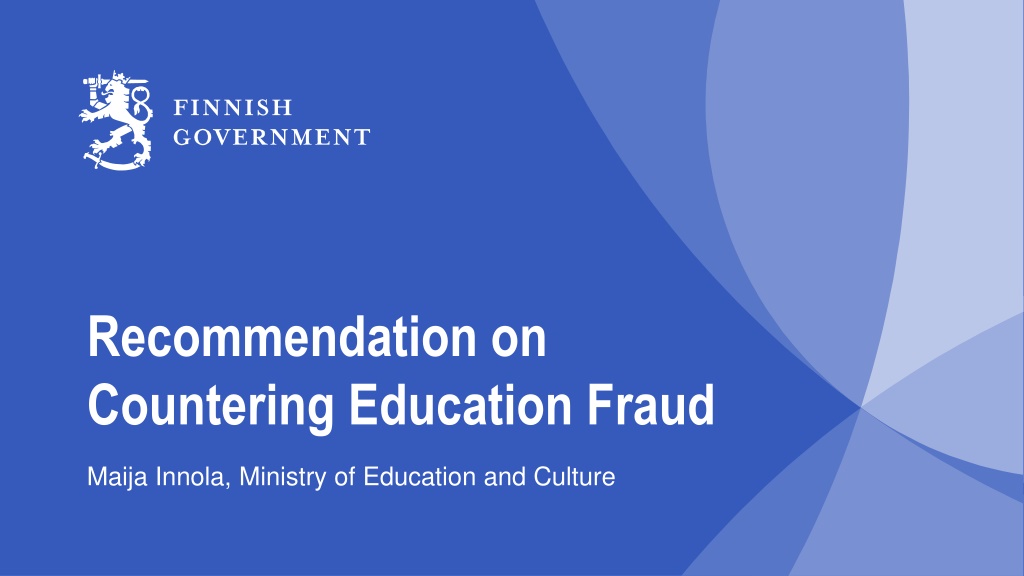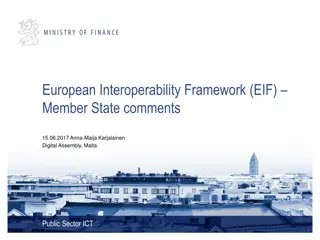
Effective Strategies to Combat Education Fraud
This comprehensive recommendation focuses on countering education fraud to ensure ethics, transparency, and integrity in education. It emphasizes the responsibility of authorities and organizations to eliminate fraudulent practices and protect learners and educators.
Download Presentation

Please find below an Image/Link to download the presentation.
The content on the website is provided AS IS for your information and personal use only. It may not be sold, licensed, or shared on other websites without obtaining consent from the author. If you encounter any issues during the download, it is possible that the publisher has removed the file from their server.
You are allowed to download the files provided on this website for personal or commercial use, subject to the condition that they are used lawfully. All files are the property of their respective owners.
The content on the website is provided AS IS for your information and personal use only. It may not be sold, licensed, or shared on other websites without obtaining consent from the author.
E N D
Presentation Transcript
Recommendation on Countering Education Fraud Maija Innola, Ministry of Education and Culture
Defenition Education fraud is behaviour or action occurring in the field of education intended to deceive and obtain an unfair advantage. the activities of diploma mills, accreditation mills, visa mills, essay mills and essay banks, as defined below impersonation by undertaking in whole or in part any work or assessment required as part of a programme in the place of an enrolled learner illegal or irregular use of authentic documents; plagiarism; production or use of forged, plagiarised or counterfeit documents; the offer of unrecognised or unaccredited qualifications with the intention of deceiving another. 2 | 3/21/2025
Aim and scope Assist member States to counter education fraud and promote and support ethics, transparency and integrity in education, and therefore to help them ensure the right to education for all learners. Recommendation apply to access to education and all levels and forms of education The recommendation underlines the responsibility of public authorities and/or professional bodies and private organisations and companies to foster the principles of ethics, transparency and integrity in education and to address education fraud. 3 | 3/21/2025
Recommendation to member states governements Effectively develop, promote and encourage quality education by eliminating, on their territory and as far as possible at transnational level, actions and activities which contribute to education fraud; Take the necessary measures to protect pupils, students, researchers and staff at all levels of education from organisations and individuals engaged in marketing and promoting education services that constitute fraud through use of the internet, social media, advertising and other means; 4 | 3/21/2025
Recommendation to member states governements Provide support for the implementation of preventative and protective measures by educational institutions and relevant stakeholders in education and employment, as well as a culture of equality of opportunity at all levels and in all sectors of education and training and in the transition between these sectors; Keep under review technological developments which may add to the list of activities constituting education fraud; Facilitate international co-operation and peer learning 5 | 3/21/2025
Awerness raising and information Education systems should set the same standards of quality and ethics for all institutions taking appropriate measures to provide information on and raise awareness about the prevention of education fraud and, through linking, in theory and in practice, quality assurance and other appropriate regulatory mechanisms provide guidelines on how to prevent education fraud and promote ethics, transparency and integrity in education to all education institutions, pupils and students 6 | 3/21/2025
Training Member States should take appropriate measures to ensure the provision of adequate training, on a continuing basis, on the prevention of education fraud and on fostering ethics, transparency and integrity for all professionals in the education, recruitment and employment sectors. 7 | 3/21/2025
Codes of ethics Member States and education institutions, through national legislation and/or institutional regulations, should establish clear codes of ethicsgoverning all aspects of education affected by education fraud, including governance, management and human resources. 8 | 3/21/2025
Research and monitoring Member States should facilitate and encourage research on education fraud in order to study its causes and effects, as well as the efficacy of measures taken to prevent and/or address it. Member States should establish a system for monitoring education fraud and the activities of fraudulent education service providers. This should include reporting by education institutions and other education stakeholders to a designated quality assurance agency, ombudsperson institution or other central body created under national legislation. 9 | 3/21/2025
Thank you for your attention! maija.innola@gov.fi

